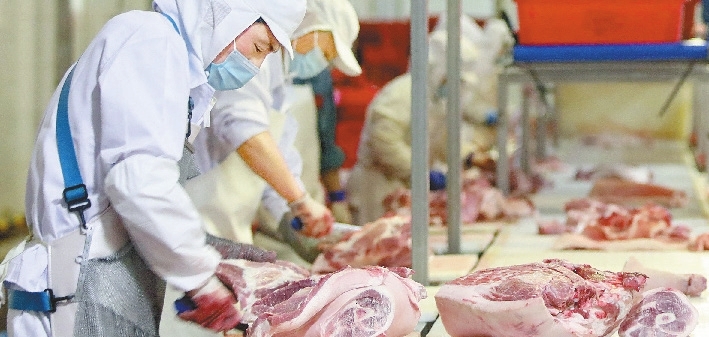
COMMITTED to ensuring food safety, China has redoubled efforts to bring safe and healthy food to dining tables in the country amid the global COVID-19 outbreak, rolling out measures to improve supervision of imported and home-produced food. As COVID-19 continues to spread globally, cluster outbreaks have been reported in several overseas food-processing enterprises, putting cold-chain products under close scrutiny of Chinese authorities. In a move to cut off possible virus transmission via imported food, China’s customs authority in July halted imports from three Ecuadorian shrimp producers, ordering frozen products from these firms to be returned or destroyed after samples from the inner wall of a container and product’s outer packaging tested positive for the virus. Though the test results don’t mean the virus could infect people via food, they exposed loopholes in companies’ food safety regulations, said Bi Kexin, head of the imported and exported food safety bureau of the General Administration of Customs. Li Ning, a researcher with the China National Center for Food Safety Risk Assessment, said that food posed a low transmission risk, but there was a possibility of transmission if the food-processing environment was contaminated or if workers got infected. Regarding food safety as an important task of the government at all levels, China has called for the strongest measures, the most rigorous standards, the strictest supervision, the most severe punishment for violators and the most serious accountability systems to ensure food safety. Faced with rising global COVID-19 cases, the task of ensuring farm-to-fork food safety entails more comprehensive containment measures. The country has been stepping up efforts to keep a close eye on both imported food and food-related industries at home. Imported food inspection To cut off overseas virus transmission channels, China intensified inspection and testing of imported food in the cold chain. As of July 9, official data showed that the country’s customs officers had tested 227,934 samples of imported cold-chain food. Mechanisms to facilitate coordination and information sharing have also been put in place, while food dealers have been requested to take immediate steps once a problem is spotted. “Whether imported or home-produced, food sold in the domestic market should be strictly supervised according to law,” said Dang Qianying, an official with the State Administration for Market Regulation. China’s inspection of imported food is in line with international standards and regulations, and won’t interrupt normal international trade, said Li Xingqian, director of foreign trade department of the Ministry of Commerce, stressing that at this special time food businesses should observe guidelines jointly issued by the World Health Organization and the U.N. Food and Agricultural Organization. Such steps are aimed at protecting people’s health, Li said, adding that Beijing’s COVID-19 outbreak in June has sparked public concerns over the risk of the virus being transmitted from imported refrigerated food. Despite stricter food supervision and inspection, China will remain committed to expanding imports, and promoting agricultural trade has always been an integral part of the country’s opening-up policy, Li said. Official data shows that food and agricultural imports of the country have grown rapidly this year despite COVID-19 disruptions. During the January-May period, imports of agricultural products rose 9 percent year on year, 17 percentage points higher than the country’s total imports during the same period of the previous year. China welcomes quality and safe food from all over the world, and stands ready to conduct in-depth cooperation with other countries to promote food safety and the healthy development of global food trade, Bi said. No stones unturned at home Chinese authorities at all levels have prioritized food safety in public health, urging greater efforts to reduce threats. In response to COVID-19, the country has clamped down on illegal wildlife trade and consumption, and tightened supervision of the food industry, covering employees, the environment and logistics. To reduce public health risks, China has banned illegal wildlife trade and consumption. It announced in July its plan to gradually close all live poultry markets. People in the food industry were the focus of anti-virus efforts. Beijing, for example, started large-scale nucleic acid testing on workers in farmers’ markets, catering and delivery industries in the wake of the outbreak in its Xinfadi wholesale market, to stem virus transmission in food-related business activities. Given that food delivery workers tend to be more frequently exposed to other people and thus face higher health risks, the country has specifically issued anti-virus guidelines for them, requesting them to keep a social distance of at least 1 meter, choose contactless means of delivery and put food in separate areas. Supervision of food markets has been intensified across the country, especially in places with large populations. In Guangdong Province, COVID-19 prevention inspections were conducted extensively, covering local farmers’ markets, retail and wholesale markets for aquatic products, and supermarkets. Also under the spotlight are domestic cold-chain food logistics. To regulate the sector, China has implemented a national regulation, outlining compulsory requirements for all links of the cold-chain food supply, including production, processing, transportation and sales. While currently resorting to the toughest measures to prevent food safety problems at their sources by supervising all links and control of risks, China in 2016 had already pledged to establish a more unified and authoritative supervision system. The country issued guidelines in 2019, aiming to tighten food safety supervision “from the farmland to the dining table” and further build up capacities to ensure whole-chain food safety and quality. According to the guideline, the country will establish a preliminary food safety supervision system based on risk control and supply management by 2020, be capable of basically bringing major food risks under control, and elevate food safety conditions to a level commensurate with the target of finishing building a moderately prosperous society in all respects. (Xinhua) | 
